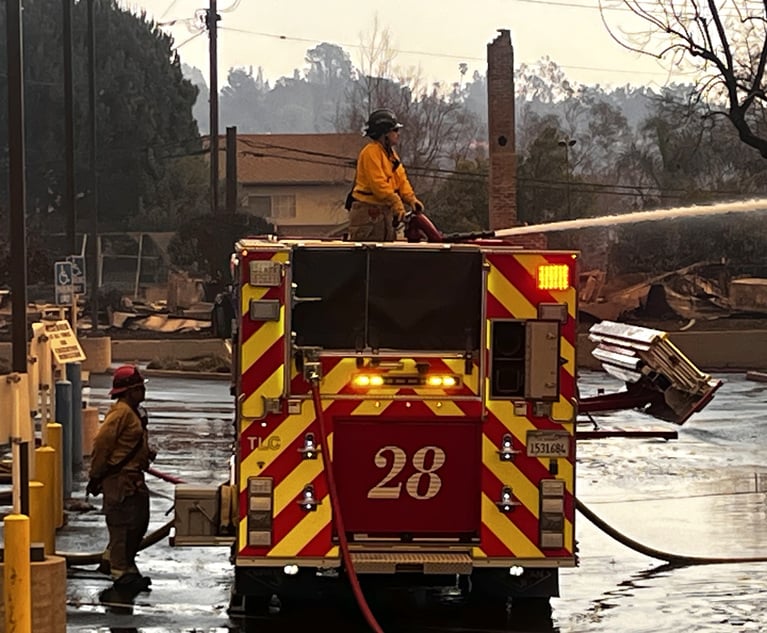California Rolled Out 278 Pages of Marijuana Rules. Here Are Highlights.
California on Thursday unveiled its latest set of marijuana regulations—this time, emergency rules that will guide the legalized recreational market when it opens in January. Here are a few takeaways from the emergency regulations presented to the committee on Thursday.
November 16, 2017 at 07:42 PM
5 minute read
 Photo illustration by Jason Doiy / The Recorder
Photo illustration by Jason Doiy / The Recorder California on Thursday unveiled its latest set of marijuana regulations—this time, emergency rules that will guide the legalized recreational market when it opens in January.
The regulations published by the Bureau of Cannabis Control, the Department of Food and Agriculture and the Department of Public Health were shaped by early draft proposals and legislation enacted this summer. They cover testing, growing, packaging and potency requirements for both the medical and recreational sectors. And they will likely change.
The state has created a Cannabis Advisory Committee, comprised of growers, retailers, union representatives and others with interests in the marijuana industry, to consider the regulations and suggest change.
Here are a few takeaways from the emergency regulations presented to the committee on Thursday.
Everything's temporary, for now.
Regulators will rely on temporary four-month licenses to get the market rolling on Jan. 1. To get those short-term permits, however, applicants will have to show that they have authorization to operate from their local government agencies. That may not be readily available, as some cities and counties are still grappling with how to handle recreational enterprises.
The regular licensing process will ramp up in 2018. While that happens, the state will operate in a six-month transition period and allow retailers and operators to move and sell existing inventory that might not meet regulations on packaging or potency caps.
It's going to cost money—a lot of it—to make money.
 Lori Ajax
Lori AjaxEveryone in the marijuana business will pay a licensing fee that varies significantly based on the size and type of operation. Someone who transports marijuana only—without performing any quality-control testing—will pay $500. The biggest distributors doing product testing will be charged $125,000 a year for a license.
That's not counting the $500 to $1,000 that license-seekers will have to pay just to apply for a permit—or the costs for entrepreneurs who need multiple licenses.
Regulation watchers have questioned whether California's fees, added to a 15 percent excise tax and local charges, will cost so much that small businesses will be squeezed out and the black market will continue to operate.
Lori Ajax, bureau chief of Cannabis Control, said Thursday the agency worked with an economist to set fees so that they only cover state costs. As to what the impact of those fees might be, “There's much work to be done on our regulations,” Ajax said.
California is about to enter the edibles shape-and-packaging debate.
The emergency regulations ban edibles that appeal to children. For now, that includes no munchables in the shape of human beings—”either realistic or caricature”—animals, fruit or insects. Edibles must be covered in an opaque packaging, which can't “imitate” any products that are marketed to kids.
Colorado has grappled with how to regulate edibles for years, a struggle amplified in 2014 when the chief medical officer called for an outright ban on consumable marijuana. Oregon approved recreational marijuana use in 2015 but did not allow edible sales until strict rules went into effect in 2016.
Miren Klein, an assistant deputy director at the California Department of Public Health, conceded Thursday that deciding what packaging and products appeals to kids is a subjective endeavor.
“We tried to outline as much as we could in this regulation package,” Klein said. “If the committee has any other ideas or suggestions that we could consider for a permanent package we definitely welcome that.”
Klein said pre-approving each product is not feasible. Pointing to California's physical and market sizes, she said, “if you think our licensing fees are expensive now that definitely will drive up the licensing fees.”
Read more:
IRS Power Is Challenged in Marijuana Dispensary's Supreme Court Petition
Marijuana's Rapid Growth Could Put New Spotlight on Arbitration
We Asked 4 Marijuana-Industry Lawyers 4 Questions. Here's What They Said
Four Takeaways From California's New Report on Banking and Marijuana
This content has been archived. It is available through our partners, LexisNexis® and Bloomberg Law.
To view this content, please continue to their sites.
Not a Lexis Subscriber?
Subscribe Now
Not a Bloomberg Law Subscriber?
Subscribe Now
NOT FOR REPRINT
© 2025 ALM Global, LLC, All Rights Reserved. Request academic re-use from www.copyright.com. All other uses, submit a request to [email protected]. For more information visit Asset & Logo Licensing.
You Might Like
View All
Farella Elevates First Female Firmwide Managing Partners

'Nerve-Wracking': Fires Disrupting but Not Halting Work of Distributed Firms' LA Lawyers
3 minute read
Miami Judge Approves Shaq's $11 Million Settlement to Resolve Astrals Investor Claims
3 minute read
Crypto Exchange’s ‘Meteoric Rise’ Leads to Nationwide Class Action Trend
4 minute readTrending Stories
Who Got The Work
J. Brugh Lower of Gibbons has entered an appearance for industrial equipment supplier Devco Corporation in a pending trademark infringement lawsuit. The suit, accusing the defendant of selling knock-off Graco products, was filed Dec. 18 in New Jersey District Court by Rivkin Radler on behalf of Graco Inc. and Graco Minnesota. The case, assigned to U.S. District Judge Zahid N. Quraishi, is 3:24-cv-11294, Graco Inc. et al v. Devco Corporation.
Who Got The Work
Rebecca Maller-Stein and Kent A. Yalowitz of Arnold & Porter Kaye Scholer have entered their appearances for Hanaco Venture Capital and its executives, Lior Prosor and David Frankel, in a pending securities lawsuit. The action, filed on Dec. 24 in New York Southern District Court by Zell, Aron & Co. on behalf of Goldeneye Advisors, accuses the defendants of negligently and fraudulently managing the plaintiff's $1 million investment. The case, assigned to U.S. District Judge Vernon S. Broderick, is 1:24-cv-09918, Goldeneye Advisors, LLC v. Hanaco Venture Capital, Ltd. et al.
Who Got The Work
Attorneys from A&O Shearman has stepped in as defense counsel for Toronto-Dominion Bank and other defendants in a pending securities class action. The suit, filed Dec. 11 in New York Southern District Court by Bleichmar Fonti & Auld, accuses the defendants of concealing the bank's 'pervasive' deficiencies in regards to its compliance with the Bank Secrecy Act and the quality of its anti-money laundering controls. The case, assigned to U.S. District Judge Arun Subramanian, is 1:24-cv-09445, Gonzalez v. The Toronto-Dominion Bank et al.
Who Got The Work
Crown Castle International, a Pennsylvania company providing shared communications infrastructure, has turned to Luke D. Wolf of Gordon Rees Scully Mansukhani to fend off a pending breach-of-contract lawsuit. The court action, filed Nov. 25 in Michigan Eastern District Court by Hooper Hathaway PC on behalf of The Town Residences LLC, accuses Crown Castle of failing to transfer approximately $30,000 in utility payments from T-Mobile in breach of a roof-top lease and assignment agreement. The case, assigned to U.S. District Judge Susan K. Declercq, is 2:24-cv-13131, The Town Residences LLC v. T-Mobile US, Inc. et al.
Who Got The Work
Wilfred P. Coronato and Daniel M. Schwartz of McCarter & English have stepped in as defense counsel to Electrolux Home Products Inc. in a pending product liability lawsuit. The court action, filed Nov. 26 in New York Eastern District Court by Poulos Lopiccolo PC and Nagel Rice LLP on behalf of David Stern, alleges that the defendant's refrigerators’ drawers and shelving repeatedly break and fall apart within months after purchase. The case, assigned to U.S. District Judge Joan M. Azrack, is 2:24-cv-08204, Stern v. Electrolux Home Products, Inc.
Featured Firms
Law Offices of Gary Martin Hays & Associates, P.C.
(470) 294-1674
Law Offices of Mark E. Salomone
(857) 444-6468
Smith & Hassler
(713) 739-1250






